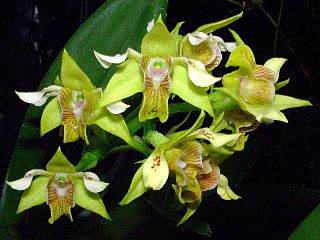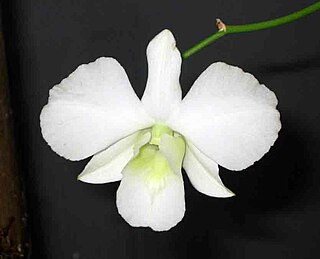
Mobile Suit Gundam 0083: Stardust Memory is a 13-episode anime OVA series set in the Gundam universe. The first volume containing two 30-minute episodes was released in Japan on May 23, 1991. Subsequent volumes, containing one 30-minute episode each, followed every one or two months; the final volume went on sale on September 24, 1992. The series was directed by Mitsuko Kase and Takashi Imanishi. A movie compilation, also directed by Imanishi was released in Japan on August 29, 1992, a month before the final OVA volume went on sale. The characters were designed by Toshihiro Kawamoto. Mechanical designs were by Shoji Kawamori and Hajime Katoki.

Dendrobium is a genus of mostly epiphytic and lithophytic orchids in the family Orchidaceae. It is a very large genus, containing more than 1,800 species that are found in diverse habitats throughout much of south, east and southeast Asia, including China, Japan, India, the Philippines, Indonesia, Australia, New Guinea, Vietnam and many of the islands of the Pacific. Orchids in this genus have roots that creep over the surface of trees or rocks, rarely having their roots in soil. Up to six leaves develop in a tuft at the tip of a shoot and from one to a large number of flowers are arranged along an unbranched flowering stem. Several attempts have been made to separate Dendrobium into smaller genera, but most have not been accepted by the World Checklist of Selected Plant Families.

Dendrobium crumenatum, commonly called pigeon orchid, or 木石斛 is an epiphytic orchid in the family Orchidaceae and is native to Asia, Southeast Asia, New Guinea and Christmas Island. It has two rows of leaves along its pseudobulb and relatively large but short-lived, strongly scented white flowers. It usually grows in exposed positions in lowland rainforest and coastal scrub.

Johannes Jacobus Smith was a Dutch botanist who, between years 1905 to 1924, crossed the islands of the Dutch East Indies, collecting specimens of plants and describing and cataloguing the flora of these islands. The standard botanical author abbreviation J.J.Sm. is applied to plants described by J.J. Smith.

Dendrobium kingianum, commonly known as the pink rock orchid, is a flowering plant in the orchid family Orchidaceae and is endemic to eastern Australia. It usually grows on rocks, rarely as an epiphyte, and has thin, spreading leaves and spikes of up to fifteen, usually pink flowers in late winter to spring. It is popular in Australian native horticulture and is a commonly cultivated orchid among Australian orchid species growers.

Dendrobium speciosum, commonly known as the rock orchid or cane orchid, is a species of highly variable Australian orchid. Its varieties can be found in a range of habitats as epiphytes or lithophytes. It has a continuous distribution along the east coast of Australia and in distinct populations along the Tropic of Capricorn. As a lithophyte, it forms gigantic spreading colonies on rocks and cliff faces, often exposed to full sun, with its roots forming dense, matted beds across the rock that anchor the plant. It can be found at altitudes from sea level to 900 metres (3,000 ft).

Dendrobium nobile, commonly known as the noble dendrobium, is a member of the family Orchidaceae. Dendrobium nobile is one of the most widespread ornamental members of the orchid family. It is the state flower of Sikkim.

Dendrobium aduncum is a species of orchid. It is native to southern China, the eastern Himalayas, and northern Indochina. It is an epiphyte and grows on the tree trunks of mountain forests.

Dendrobium aphyllum, commonly known as the hooded orchid or 兜唇石斛 is a species of orchid native to Bangladesh, southern China, the eastern Himalayas, and Indochina.

Dendrobium bigibbum, commonly known as the Cooktown orchid or mauve butterfly orchid, is an epiphytic or lithophytic orchid in the family Orchidaceae. It has cylindrical pseudobulbs, each with between three and five green or purplish leaves and arching flowering stems with up to twenty, usually lilac-purple flowers. It occurs in tropical North Queensland, Australia and New Guinea.

Dendrobium discolor, commonly known as antler orchid or golden orchid, is a species of epiphytic or lithophytic orchid in the family Orchidaceae, and are native to northern Australia, New Guinea, and part of Indonesia. It has cylindrical pseudobulbs, each with between ten and thirty five leathery leaves, and flowering stems with up to forty mostly brownish or greenish flowers with wavy and twisted sepals and petals.

Dendrobium gracilicaule, commonly known as the blotched cane orchid or yellow cane orchid, is an epiphytic or lithophytic orchid in the family Orchidaceae. It has cylindrical pseudobulbs, between three and seven thin leaves and up to thirty often drooping, cream-coloured to yellow or greenish flowers, sometimes with reddish brown blotches on the back. There are two varieties, one occurring in Queensland and New South Wales and the other on some Pacific Islands, including Lord Howe Island.

Dendrobium macrophyllum, commonly known as the large-leaved dendrobium or pastor's orchid, is a species of Orchid.

Dendrobium moniliforme, known as Shihu in Chinese and Sekkoku in Japanese, is a species of orchid. It is native to Japan, Korea, China, the Himalayas, and northern Indochina.

Dendrobieae is a tribe in the subfamily Epidendroideae, in the family Orchidaceae. The Dendrobieae are mostly tropical, epiphytic orchids which contain pseudobulbs.

Dendrobium plicatile is an Asian orchid species, a member of the genus Dendobium. It was formerly described as Flickingeria fimbriata.

Dendrobium section Dendrocoryne is a subgenus of orchids in the genus Dendrobium.

Dendrobium section Phalaenanthe is a section of the genus Dendrobium.

Dendrobium section Dendrobium is a section of the genus Dendrobium.




















